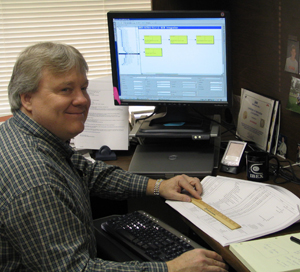Meet the IBEX Team: Bob Harbaugh

If you have trouble keeping track of when your homework is due, you may want to get some help from Bob Harbaugh
Bob manages the ultimate "assignment notebook". As the IBEX mission planner, Bob makes sure that all the teams working on IBEX know when to complete their tasks so that the mission launches on time. To do this, he helps all the teams set up electronic schedules and calendars, and teaches them to use them. The electronic schedules function like huge, overlapping assignment notebooks that lay out the detailed tasks or activities that need to be accomplished. The schedules also show how each task or activity relates to the others, and the order in which they need to be completed (their logic relationships).
"Once we build the schedule, we can then move forward and develop the hardware and software needed to successfully complete the mission. I think this initial schedule development effort is one of the most fun aspects of Planning because it allows for some real creativity and open-mindedness necessary while laying out what," Bob said.
Mission planning is an important, complex job that requires an eye for detail, and Bob loves it. "I have a passion for what I do because I want our team to succeed. I want us to have a successful mission and ensure we have a timely delivery that is on cost. If we do this, our reputation in the industry and with our customers will improve, and we'll have opportunities abundant," he said.
This month, Bob has concentrated on creating that über-assignment notebook. "Specifically, [I've been] integrating all the various schedule elements from all of our teammates into a cohesive, fully integrated and statused scheduling package. Each team typically works with blinders on and pays attention to what relates to them directly, but they sometimes don't pay as much attention to what the teams that may join them later are doing, so I integrate all the pieces to paint a clear picture to management on how we are performing, identify our problems of today and potential problems of tomorrow, and project the future based on where we are today and what we have left to do."
Being a mission planner was never something Bob dreamed of doing while growing up in Seat Pleasant, Maryland. "I grew up as a happy kid, but I wasn't sure what I wanted to do. I didn't have an aspiring interest at the time, but I knew that I wanted to be successful. I'm a detail oriented person and I wanted to make a contribution to whatever career I chose," he said. For a while, Bob thought that being a park ranger would let him bring his love of camping, hiking, canoeing, and the outdoors into his work. "I thought it would be the job of nirvana, up on a national park tower. But it never came to be," he said.
When he was 19 years old, Bob joined the Navy, where he worked for five years. "I joined the Navy in hopes of moving into a career field, which I did as an operations specialist, which like Planning is a very detailed-oriented field. I figured I could take this out into the real world and apply it in some shape or form," Bob said.
After leaving the Navy, he worked as a technical writer for another five years before a friend convinced him to try his hand as a schedule planner at Martin Marietta in 1985. Bob has been working in the field ever since. He made the switch from planning for defense projects to planning for space missions in the mid-nineties, when he had the opportunity to work as a contract planner for NASA's Goddard Space Flight Center. While working on the IMAGE project, he made contacts at the Southwest Research Institute (SwRI), and eventually moved to San Antonio with his "lovely, beautiful wife" and three "wonderful children," now ages 15, 18 and 21, to work there full-time.
In addition to being the mission planner for IBEX, Bob also mentors seven aspiring planners in his division at SwRI and coordinates the efforts of planners at IBEX team sites around the world. "I've worked with [the aspiring planners] for a number of years, and they've become really good planners. It's a big, important part of my job. Some IBEX team sites have planners who don't have mentors, so I guide them each month and mentor the IBEX team to ensure that they are pushing forth accurate information to me and the IBEX core management team, which I'm a proud member of," Bob said.
Bob describes a typical day at his job as "hectic". He participates in multiple meetings each week and at least two teleconferences per day with mission principle investigators and engineering staff. "Throw in an occasional web-based 'WebEx' meeting and your days get pretty full," Bob said.
Working with so many people requires excellent communication skills. "I'm a proponent about knowing a little bit about a lot of things, and information is key to my success. Being versed in how scientists, managers, engineers and technicians think is really important because I need to help other people help me to get my job done, and that may require me to help draw needed information out of them in a manner they might understand. I have to affectively deal with [different types of people] and maintain a good team relationship at all times," Bob said.
Bob finds that being a good leader means being able to compromise and find solutions with his team. "I'm finding the preferable win-win situation between myself and my subordinates and peers is that all parties mutually understand and agree on a course of action. As a manager, planner, mentor and group leader, I have to confront people when there are issues to deal with, and to come upon a decision on how to move forward together," he said.
Bob looks to other senior staff at SwRI as examples of inspirational leaders. "They have vision, goals and are leaders of people. People like that really inspire me. It's not about them; it's about what we collectively need to do. I was at [the Adler Planetarium] last summer and shook [retired Gemini and Apollo astronaut] Jim Lovell's hand. People like that who reach out beyond limits are the people who inspire me. I always tell my Planning Team to become a driver and not a passenger. Be proactive," Bob said.
To succeed in his field, Bob has found that being proactive has been "key". He also said, "A big part of my job is helping others succeed, and to move into a role like this, that has to be one of your focus points, too."
While Bob did not complete requirements for a bachelor's degree, he found that continuing his education through business management courses has been integral to being able to coordinate with partners on a large, multi-organization project like IBEX. "My education to date has been geared towards the business management field. Understanding contracts, budgets, funding and the basic legalities of doing business with a partner or contractor have helped me understand the business aspects of doing a big project like this, which has been very helpful," Bob said.
He recommends that anyone interested in a career in planning acquire practical business and communication skills. "I would [recommend] having a background in business management skills, perhaps contractual and/or financial, and most importantly, having a passion for detail and communicating with others. That's a big part of my job, communicating," Bob said.
Planning is an up and coming field, and a good career choice for detail-oriented people who enjoy communicating, Bob said. "My field is a very young field. It's only been around for 30 years or so. It used to be part of management, but now it's a discrete discipline due to its unique complexities, and I think it will flourish for years and years to come."
Although Bob is a master planner, he has yet to fit everything he wants to do into his personal "assignment notebook" - he's too busy planning the IBEX mission! "Well, I'm beginning to work with some wood and make some sawdust, and I'd like to pick up golfing," he said. "I really need to make time, that's the key in life. You get so consumed in things..." he said before preparing to fly to Switzerland to help the IBEX team there get their schedules in order!
